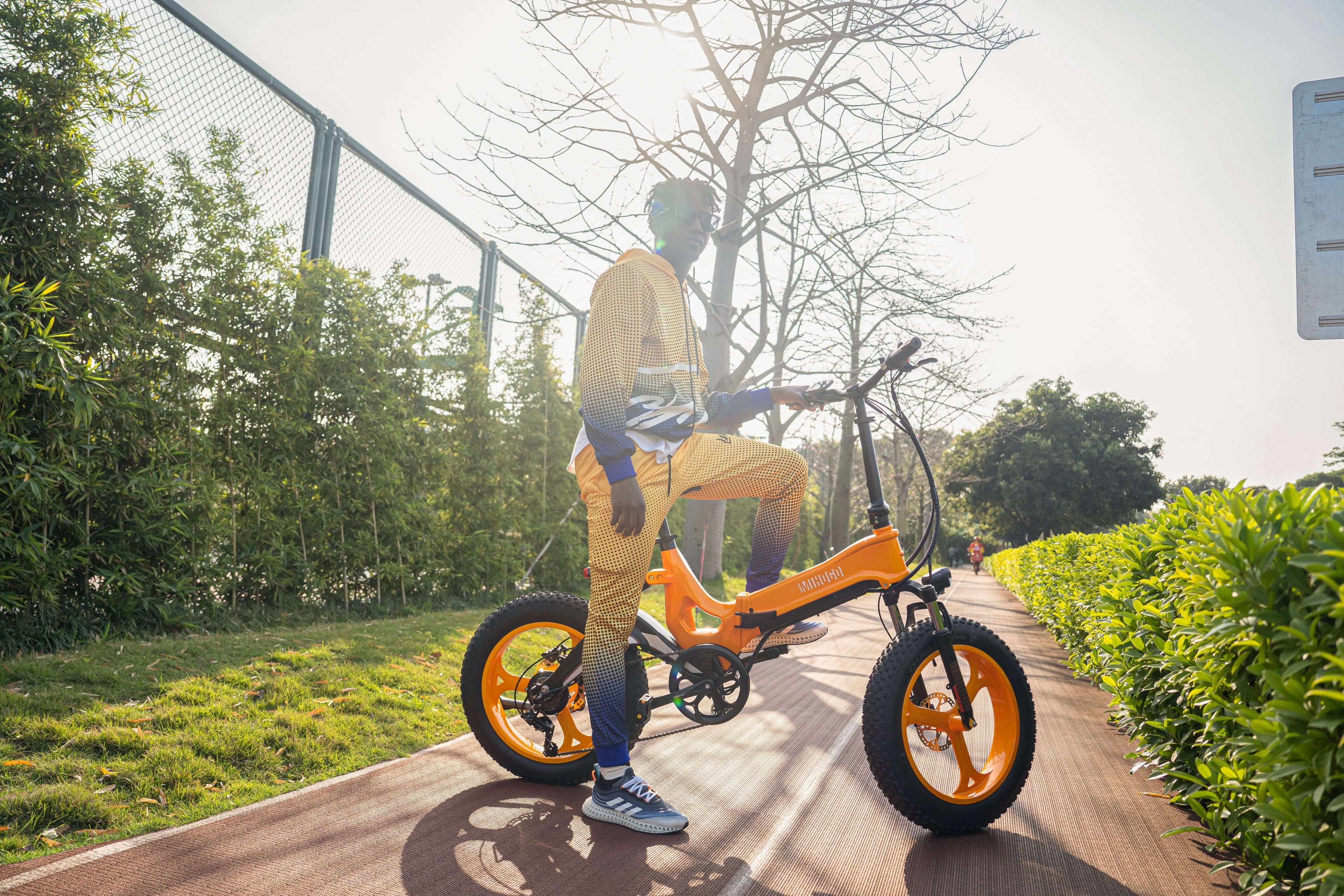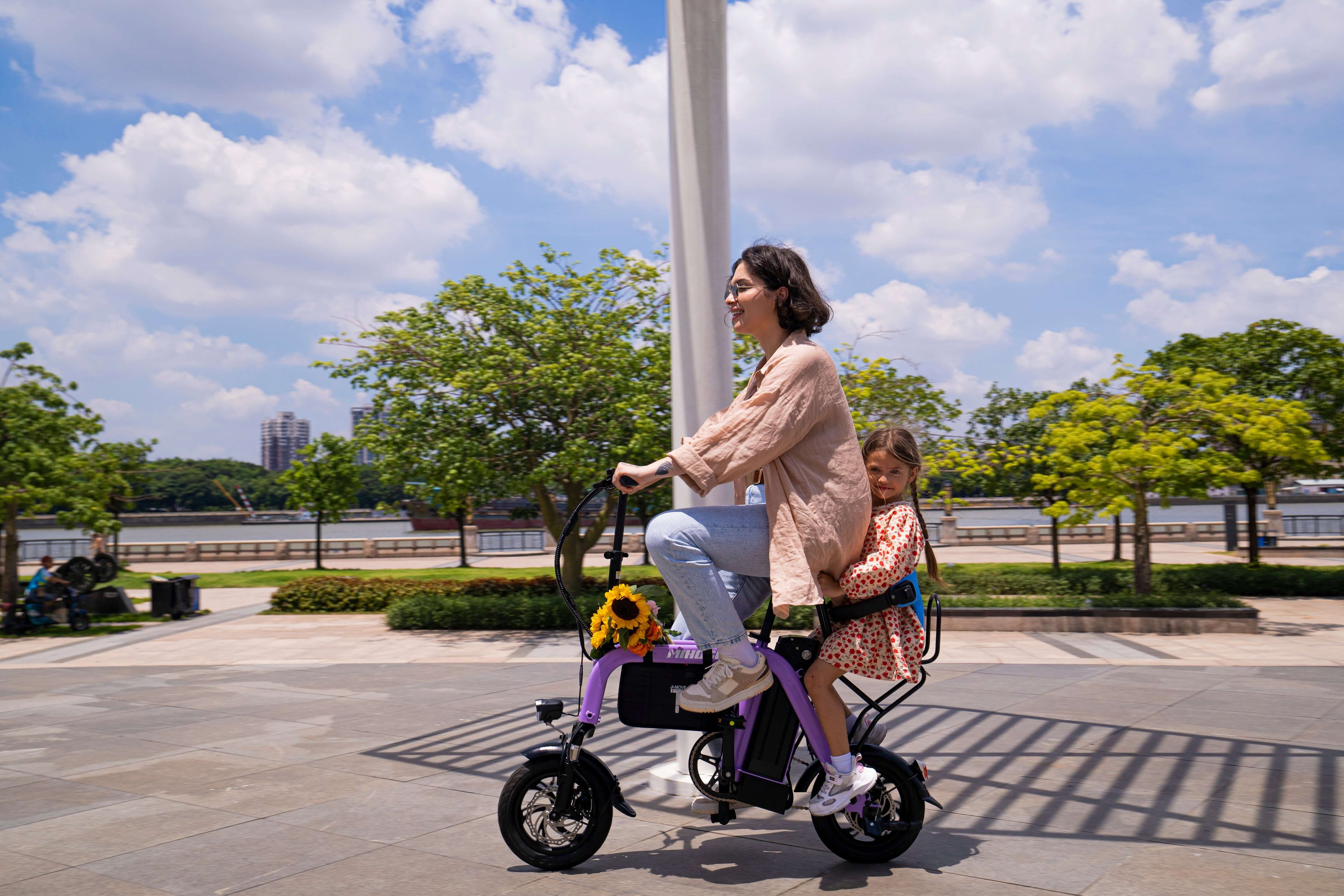Why Choose Mihogo E-Bikes for Bikepacking Adventures
The evolution of electric bikepacking has opened new possibilities for outdoor enthusiasts. One significant trend in 2025 is the increasing adoption of e-bikes for bikepacking. These bikes extend the range and accessibility of bikepacking to more riders. Mihogo's diverse electric bike lineup offers perfect solutions for every type of bikepacking expedition.
Best Mihogo E-Bikes for Multi-Day Trips
Mihogo Air750 Max - Premium Carbon Adventure
- 750W motor power delivers reliable assistance on steep climbs
- 121-mile range perfect for long-distance touring
- Carbon fiber construction reduces weight without sacrificing durability
- 25MPH top speed for efficient trail coverage
- Ideal for riders 5'7" to 6'10"
MIHOGO ONE Utility EBIKE - Ultimate Versatility
- Exceptional 167-mile range for extended expeditions
- Utility design accommodates extensive gear mounting
- 750W motor handles heavy loads with ease
- E-bike battery management tips for maximizing range
MIHOGO RX 2.4 - Compact Adventure
- Folding design perfect for mixed transportation
- 40-mile range suitable for shorter bikepacking trips
- 500W motor provides adequate power for moderate terrain
- Folding e-bike travel guide for compact adventures
Essential Bikepacking Gear Categories
Power Management for Extended Trips
Electric bike bikepacking requires careful power planning. When using an e-bike for bikepacking, plan carefully around battery range and recharging opportunities. In remote areas, consider carrying a spare battery or solar charging equipment.
Core Power Essentials:
- Portable power bank (20,000mAh minimum)
- Solar charging panel for remote locations
- Multiple charging cables
- Backup battery if available for your Mihogo model
Ultralight Shelter Systems
The camping gear revolution has dramatically reduced the weight and bulk of overnight equipment. Modern bikepacking demands compact, lightweight shelter solutions.
Recommended Shelter Options:
- Ultralight bikepacking tents under 3 pounds
- Big Agnes Bikepacking Series continues to lead with bike-specific features
- Minimalist tarp and bivy combinations
- [Internal Link: Lightweight camping gear selection] for weight-conscious bikepackers
Bikepacking Bag Systems
The core of bikepacking gear is the bag system that attaches directly to your bike without racks. A complete setup typically includes:
Frame Bags:
- Custom-fit triangle bags maximize storage
- Waterproof materials essential for electronics
- Easy access pockets for frequently used items
Handlebar and Seat Bags:
- Saltyroll handlebar bag—which bikepackers applaud for its capacity to hold their shelter and tent poles
- Seat post bags for sleeping systems
- Compression straps for varied load sizes
Navigation and Electronics Protection
Modern bikepacking relies heavily on electronic navigation and communication tools.
Essential Electronics:
- Smartphone with offline maps
- GPS bike computer for extended battery life
- Power bank: I bring a charged power bank to recharge my phone, lights, or GPS
- Waterproof cases for all devices
For comprehensive navigation resources, check out the Wikipedia article on GPS navigation to understand modern positioning technology.
Multi-Day Trip Planning Essentials
Route Selection for E-Bikes
Electric bikes open unique opportunities for bikepacking route selection. Consider these factors when planning multi-day adventures:
Terrain Considerations:
- Match route difficulty to your Mihogo model's capabilities
- Plan charging stops every 40-80 miles depending on terrain
- Research elevation profiles for battery consumption estimates
Resupply Strategy:
- Identify towns with electrical outlets
- Plan rest stops at cafes and visitor centers
- Consider battery swapping locations if available
Weather-Specific Gear Adaptations
Rain gear including a helmet cover (in a pinch you can use a shower cap), shoe covers, pants and jacket remain essential for multi-day adventures.
Climate-Specific Essentials:
- Waterproof gear for wet conditions
- Sun protection for desert riding
- Insulation layers for mountain adventures
- Extra battery protection in extreme temperatures
Safety and Mechanical Preparedness
E-Bike Specific Tools
Electric bikes require specialized maintenance considerations beyond traditional bicycles.
Essential Repair Kit:
- A multi-tool: One with a chain breaker and a variety of hex/torx keys is ideal
- Tire repair supplies for tubeless systems
- Basic electrical connection cleaners
- Spare fuses if applicable to your Mihogo model
Emergency Preparedness
If you run into a bike problem along the ride that you can't fix you can always call family or friends for some help. And if you have a real emergency you can call 911 for help.
Communication Essentials:
- Satellite communicator for remote areas
- Emergency contact information
- First aid supplies
- Emergency food reserves
Nutrition and Hydration Strategy
Extended Range Hydration
It's important to stay hydrated by carrying an adequate amount of water. You can take water in a water bottle and cage on the bike and there is also the option of more water in a hydration pack.
Hydration Solutions:
- Multiple water bottle mounts on Mihogo frames
- Hydration bladder systems
- Water purification tablets for natural sources
- Electrolyte supplements for long days
Lightweight Nutrition Planning
Multi-day bikepacking requires careful nutrition balance between weight and energy density.
Food Strategy:
- Dehydrated meals for dinner
- Energy-dense snacks for riding
- Emergency food reserves
- Lightweight cooking systems
Learn more about outdoor nutrition from the National Geographic adventure nutrition guide for comprehensive meal planning strategies.
Technology Integration for Modern Bikepacking
Smart Features and Connectivity
Modern Mihogo e-bikes integrate seamlessly with bikepacking technology needs.
Digital Integration:
- Smartphone mounts for navigation
- USB charging ports where available
- GPS tracking for safety
- Weather monitoring apps
Photography and Documentation
Capturing multi-day adventures requires weather-resistant equipment and power management.
Documentation Gear:
- Weatherproof camera protection
- Extra memory cards
- Portable photo editing capabilities
- Social media planning for connectivity windows
Seasonal Adaptations and Climate Considerations
Summer Bikepacking Essentials
Hot weather bikepacking demands specific gear modifications and safety considerations.
Heat Management:
- Additional water capacity
- Cooling towels
- Sun protection clothing
- Early morning departure planning
Winter and Cold Weather Adaptations
With its 750W rear hub, 4-inch-wide tires, and 60mm travel RST suspension fork, it's cushy and stable enough to tackle potholes on city streets and the occasional dirt, rocks, and snow.
Cold Weather Gear:
- Battery insulation systems
- Waterproof clothing layers
- Emergency warming supplies
- Extended lighting systems
Advanced Bikepacking Techniques
Load Distribution Optimization
Proper weight distribution significantly impacts e-bike handling and battery efficiency.
Weight Management:
- Heavy items low and centered
- Frequently used items easily accessible
- Battery protection from impacts
- Aerodynamic considerations for efficiency
Group Bikepacking Coordination
Multi-day group adventures require additional planning and communication strategies.
Group Considerations:
- Mixed ability accommodation
- Charging station coordination
- Emergency protocol establishment
- Gear sharing opportunities
For insights into group outdoor activities, explore the Bikepacking.com community resources for route sharing and group coordination strategies.
Maintenance During Extended Trips
Daily Maintenance Routines
Consistent daily checks prevent major mechanical issues during multi-day adventures.
Daily Checklist:
- Tire pressure verification
- Chain lubrication assessment
- Electrical connection inspection
- Brake function testing
Emergency Repairs and Troubleshooting
A good repair kit can be the difference between a smooth bikepacking trip and a long walk to civilization.
Critical Skills:
- Flat tire repair proficiency
- Chain repair techniques
- Basic electrical troubleshooting
- Emergency gear substitutions
Environmental Responsibility and Leave No Trace
Sustainable Bikepacking Practices
Electric bikepacking offers environmentally conscious adventure opportunities while requiring responsible practices.
Eco-Friendly Approaches:
- Solar charging when possible
- Minimal impact camping
- Trail preservation awareness
- Wildlife disturbance prevention
Waste Management and Sustainability
Zero-Waste Strategies:
- Reusable container systems
- Biodegradable soap products
- Proper battery disposal planning
- Food packaging minimization
Conclusion: Your Mihogo Bikepacking Adventure Awaits
Multi-day e-bike bikepacking with Mihogo electric bikes opens incredible adventure possibilities previously accessible only to the most experienced cyclists. Whether you choose the long-range MIHOGO ONE Utility for extended expeditions, the lightweight Air750 Max for performance-focused adventures, or the versatile RX 2.4 for compact exploration, proper gear selection and planning ensure memorable and safe experiences.
The combination of electric assistance, modern ultralight gear, and careful preparation allows adventurers of all skill levels to explore remote destinations while maintaining comfort and safety standards. Start planning your next multi-day adventure with confidence, knowing your Mihogo e-bike provides the power and reliability needed for unforgettable bikepacking experiences.
Remember that successful bikepacking comes from experience and gradual skill development. Begin with shorter overnight trips to test your gear systems and build confidence before attempting extended multi-day expeditions. With proper preparation and the right Mihogo electric bike, the world of bikepacking adventure awaits your exploration.








